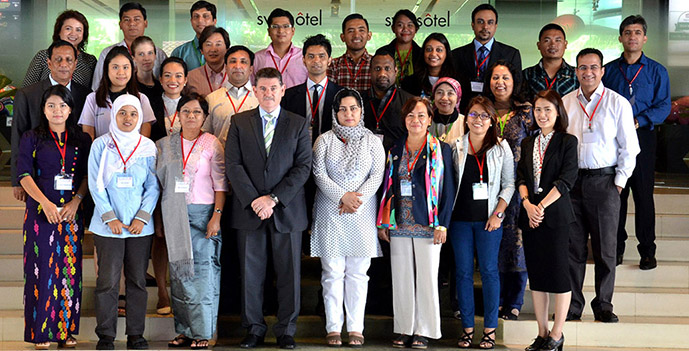- About Us
-
Who we are
-
- Publications
-
- ADPC Academy
-
MediaADPC'S NEWS
ADPC and IPPF: Training on reproductive health in emergencies ADPC and IPPF: Training on reproductive health in emergencies
19 May 2015
Bangkok, Thailand
Asian Disaster Preparedness Center in cooperation with the International Planned Parenthood Foundation (IPPF) organizes a regional training course on Minimum Initial Service Package (MISP) for Reproductive Health in Crises on 19–22 May 2015 in Bangkok.
Customized for reproductive health coordinators from a number of countries in the Asian region, the training is based on the Inter-Agency Working Group curriculum used by IPPF’s Sexual Reproductive Health Programme in Crisis and Post-Crisis Situations (SPRINT).
The goal of the training is to enhance the capacity of humanitarian aid workers and their organizations to better respond to reproductive health needs in emergencies, with a special focus on refugees and internally displaced persons.
The training course is participated by reproductive health coordinators from across the Asian region.
Health services for the most vulnerable populations
According to the United Nations Population Information Network, among women of reproductive age, more than one third of the healthy years of life lost are due to reproductive health problems, including unregulated fertility, maternal mortality and morbidity, and sexually transmitted diseases, while the equivalent number for men is 12 percent.
“Approximately 800 women die from preventable causes related to pregnancy and childbirth every day, and 99 percent of all maternal deaths occur in developing countries,” said Mr. Shane Wright, Executive Director of ADPC at the opening ceremony of the training course.
“A recent UNCHR report stated that there are now 50 million people who have fled from their homes, which is the largest number since the end of the Second World War. Thirty million people are displaced in their own country, 10 million are stateless, and 20 million have become refugees. These numbers illustrate the massive need for health services, including reproductive health, among these vulnerable populations,” Mr. Wright added.
Pool of resources on reproductive health in Asia
Through the training course, ADPC and IPPF-SPRINT hope to establish a pool of resources on reproductive health in emergencies to be utilized at regional and national levels in Asia.
Funded by the Department of Foreign Affairs and Trade of Australia, the training course aims to increase the capacity of the professionals in implementing the Minimum Initial Service Package (MISP) for reproductive health in crisis situations at the national level.
“Our aim is that in a disaster situation, you as reproductive health coordinators will be able to start an effective and coordinated response for sexual reproductive health in your countries,” said Dr. Subatra Jayaraj, Regional Manager for the SPRINT Initiative, IPPF East and Southeast Asia and Oceania Region to the participants of the training course.
“I would like to reiterate again, that sexual reproductive health in crisis is not a luxury – it is a human right. The SPRINT Initiative represents IPPF’s commitment to increasing access to sexual and reproductive health services to all vulnerable populations worldwide,” she stated.
IPPF’s SPRINT Initiative is a Sexual and Reproductive Health Programme in Crisis and Post-Crisis Situations. SPRINT ensures access to essential lifesaving sexual and reproductive health services for women, men and children in times of crises, a time when services are most needed yet are not prioritized or recognized by key humanitarian responders.
The SPRINT Initiative saves lives and delivers on the Australian Government aid, which aims to provide more effective preparedness for and response to disasters and crises.
Mr. Sajedul Hasan, Director at ADPC, welcomed the participants to the training course on Minimum Initial Service Package
for Reproductive Health in Crises.
"Our aim is that in a disaster situation, you as reproductive health coordinators will be able to start an effective and coordinated
response for sexual reproductive health in your countries,” said Dr. Subatra Jayaraj, Regional Manager for IPPF-SPRINT in
the East and Southeast Asia and Oceania Region to the participants of the training course.
Mr. Shane Wright, Executive Director of ADPC highlighted the importance of providing reproductive health services to
vulnerable populations.Latest NewsRelated Trainings
-